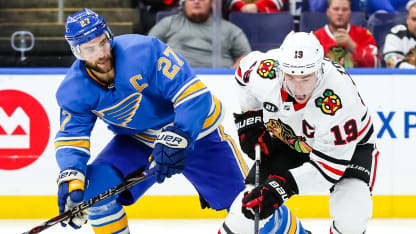The Chicago Blackhawks will try to end an eight-game losing streak (0-6-2) when they host the St. Louis Blues (8 p.m. ET; NBCSN) in the first game of a "Wednesday Night Hockey" doubleheader. The losing streak began when the Blues defeated the Blackhawks 7-3 in St. Louis on Oct. 27.
'Wednesday Night Hockey': 5 Storylines
Blackhawks visit Blues, aim to end eight-game slide; struggling Golden Knights host Ducks

© Icon Sportswire/Getty Images
CHI@CAR: DeBrincat pots Kahun's between-the-legs pass
VGK@MTL: Marchessault has puck go in off skate

















